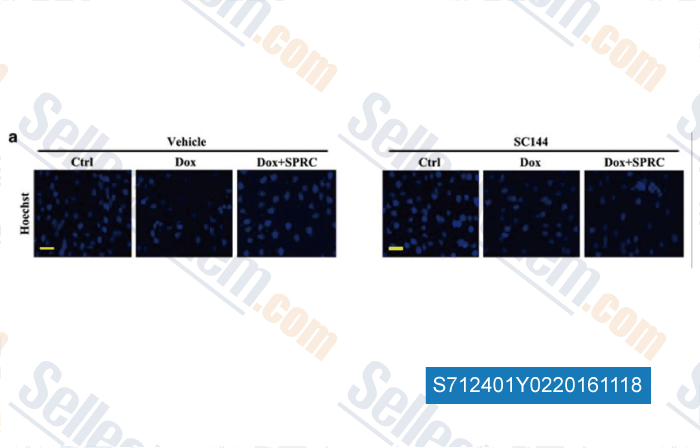|
Toll Free: (877) 796-6397 -- USA and Canada only -- |
Fax: +1-832-582-8590 Orders: +1-832-582-8158 |
Tech Support: +1-832-582-8158 Ext:3 Please provide your Order Number in the email. |
Technical Data
| Formula | C16H11FN6O |
|||
| Molecular Weight | 322.3 | CAS No. | 895158-95-9 | |
| Solubility (25°C)* | In vitro | DMSO | 28 mg/mL (86.87 mM) | |
| Water | Insoluble | |||
| Ethanol | Insoluble | |||
|
* <1 mg/ml means slightly soluble or insoluble. * Please note that Selleck tests the solubility of all compounds in-house, and the actual solubility may differ slightly from published values. This is normal and is due to slight batch-to-batch variations. * Room temperature shipping (Stability testing shows this product can be shipped without any cooling measures.) |
||||
Preparing Stock Solutions
Biological Activity
| Description | SC144 is the first-in-class orally active small-molecule gp130 inhibitor that induces gp130 phosphorylation (S782) and deglycosylation, abrogates Stat3 phosphorylation and nuclear translocation, and further inhibits the expression of downstream target genes. | |
|---|---|---|
| Targets |
|
|
| In vitro | SC144 exhibits potent cytotoxicity against a panel of drug-sensitive and drug-resistant cancer cell lines. SC144 shows synergism when co-treated in colorectal cancer HT29 cells. In addition, the combination of SC144 exhibited synergism in MDA-MB-435 cells with a schedule-dependent block in cell cycle. [1] SC144 treatment in vitro induces gp130 phosphorylation and deglycosylation, resulting in the downregulation of surface-bound gp130 and the abrogation of gp130-associated Stat3 activation. In addition, SC144 selectively inhibits the downstream signaling activation induced by gp130 substrates, including IL-6 and LIF. Protein expression regulated by the gp130/Stat3 axis in OVCAR-8 cells is also down-regulated after SC144 treatment, including Bcl-2, Bcl-XL, survivin, cyclin D1, MMP-7, gp130 and Ape1/Rel-1. [2] |
|
| In vivo | SC144 significantly inhibits tumor growth in a mouse xenograft model of human ovarian cancer via i.p. or p.o. administration. After SC144 treatment for two months, gp130, Bcl-2, Bcl-XL, MMP-7 and Ape1/Ref-1 protein levels are substantially decreased in the tumor site in the treatment group compared with the control group. [2] In an MDA-MB-435 mouse xenograft model, co-administration of SC144 delays tumor growth in an SC144 dose-dependent manner. Evaluation of the pharmacokinetics of SC144 reveals that intraperitoneal administration of SC144 shows a two-compartmental pharmacokinetics elimination profile that is not observed in the oral dosing. [1] |
Protocol (from reference)
| Cell Assay: |
|
|---|---|
| Animal Study: |
|
References
|
Customer Product Validation

-
Data from [Data independently produced by , , Cell Death Dis, 2016, 7(8):e2339.]
Selleck's SC144 has been cited by 19 publications
| A patient-derived T cell lymphoma biorepository uncovers pathogenetic mechanisms and host-related therapeutic vulnerabilities [ Cell Rep Med, 2025, S2666-3791(25)00102-8] | PubMed: 40147445 |
| Glycoprotein 130 Antagonism Counteracts Metabolic and Inflammatory Alterations to Enhance Right Ventricle Function in Pulmonary Artery Banded Pigs [ bioRxiv, 2025, 2025.01.20.633954] | PubMed: 39896622 |
| Multiomic analyses uncover immunological signatures in acute and chronic coronary syndromes [ Nat Med, 2024, 30(6):1696-1710] | PubMed: 38773340 |
| Multiomic analyses uncover immunological signatures in acute and chronic coronary syndromes [ Nat Med, 2024, 10.1038/s41591-024-02953-4] | PubMed: 38773340 |
| Detection of senescence using machine learning algorithms based on nuclear features [ Nat Commun, 2024, 15(1):1041] | PubMed: 38310113 |
| LIF signaling regulates outer radial glial to interneuron fate during human cortical development [ Cell Stem Cell, 2023, 30(10):1382-1391.e5] | PubMed: 37673072 |
| Targeting the gp130/STAT3 Axis Attenuates Tumor Microenvironment Mediated Chemoresistance in Group 3 Medulloblastoma Cells [ Cells, 2022, 11(3)381] | PubMed: 35159191 |
| Gp130-Mediated STAT3 Activation Contributes to the Aggressiveness of Pancreatic Cancer through H19 Long Non-Coding RNA Expression [ Cancers (Basel), 2022, 14(9)2055] | PubMed: 35565185 |
| MBL Binding with AhR Controls Th17 Immunity in Silicosis-Associated Lung Inflammation and Fibrosis [ J Inflamm Res, 2022, 15:4315-4329] | PubMed: 35923908 |
| Falcarindiol Enhances Cisplatin Chemosensitivity of Hepatocellular Carcinoma via Down-Regulating the STAT3-Modulated PTTG1 Pathway [ Front Pharmacol, 2021, 12:656697] | PubMed: 34025420 |
RETURN POLICY
Selleck Chemical’s Unconditional Return Policy ensures a smooth online shopping experience for our customers. If you are in any way unsatisfied with your purchase, you may return any item(s) within 7 days of receiving it. In the event of product quality issues, either protocol related or product related problems, you may return any item(s) within 365 days from the original purchase date. Please follow the instructions below when returning products.
SHIPPING AND STORAGE
Selleck products are transported at room temperature. If you receive the product at room temperature, please rest assured, the Selleck Quality Inspection Department has conducted experiments to verify that the normal temperature placement of one month will not affect the biological activity of powder products. After collecting, please store the product according to the requirements described in the datasheet. Most Selleck products are stable under the recommended conditions.
NOT FOR HUMAN, VETERINARY DIAGNOSTIC OR THERAPEUTIC USE.
